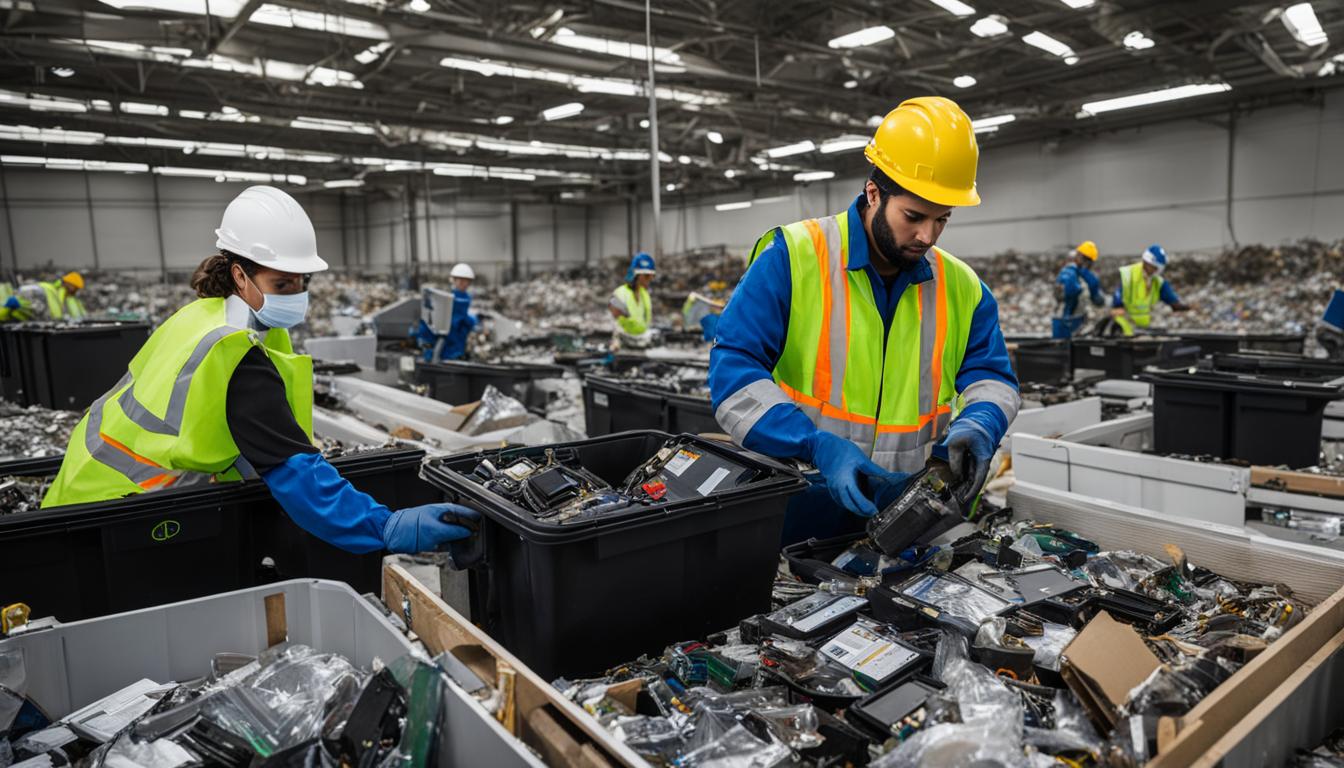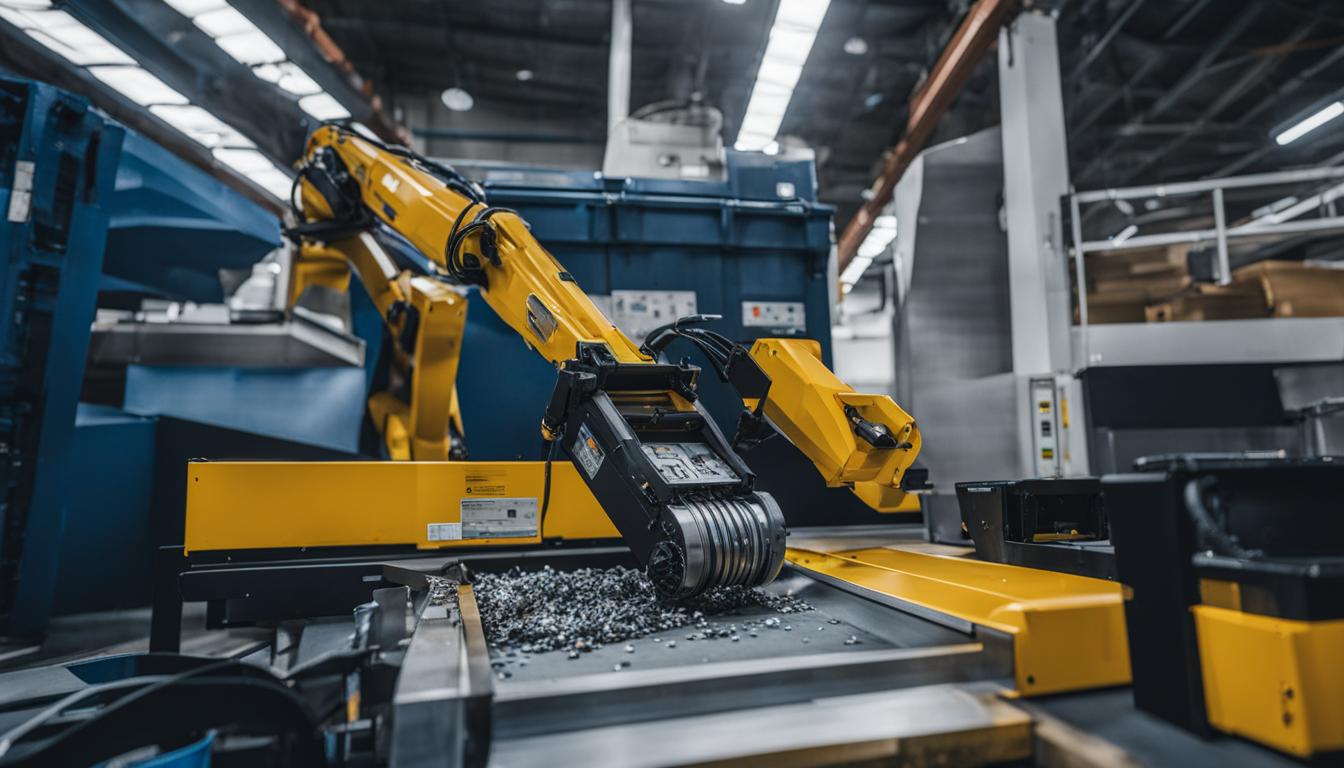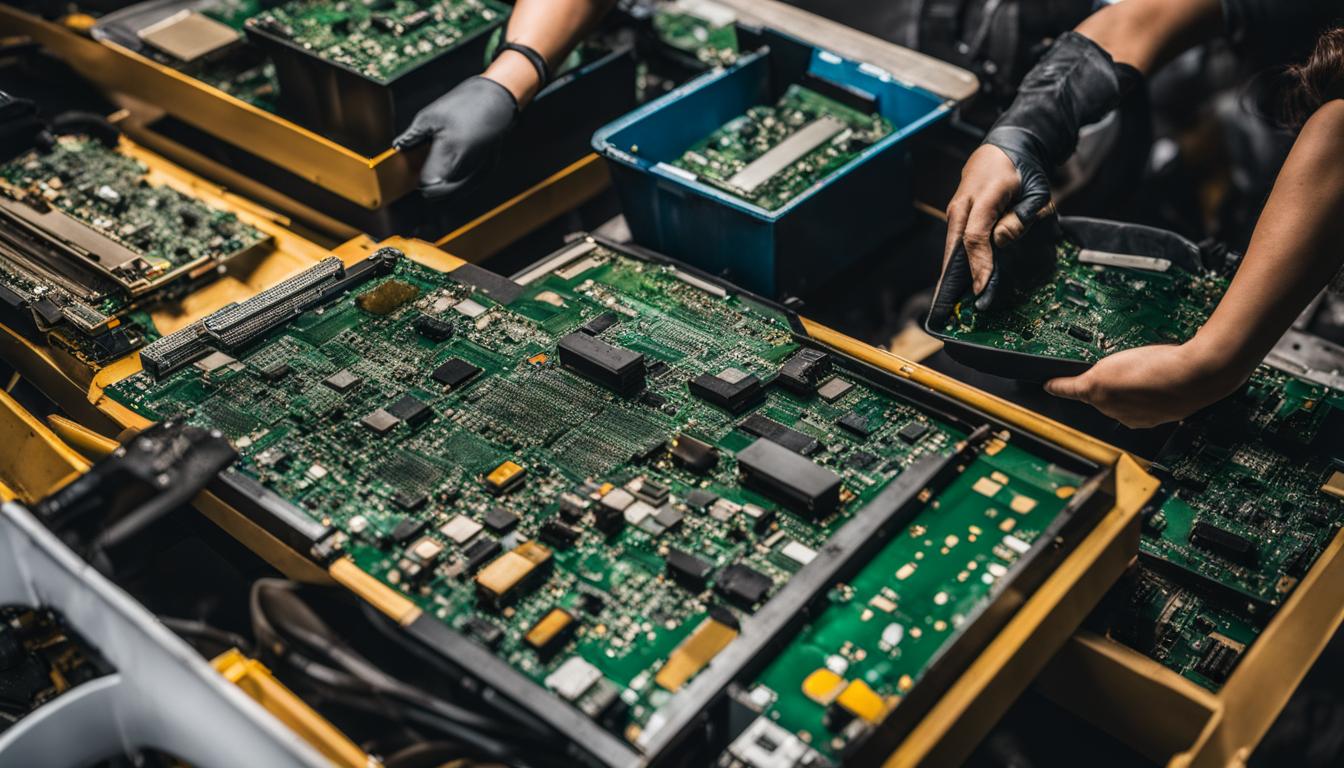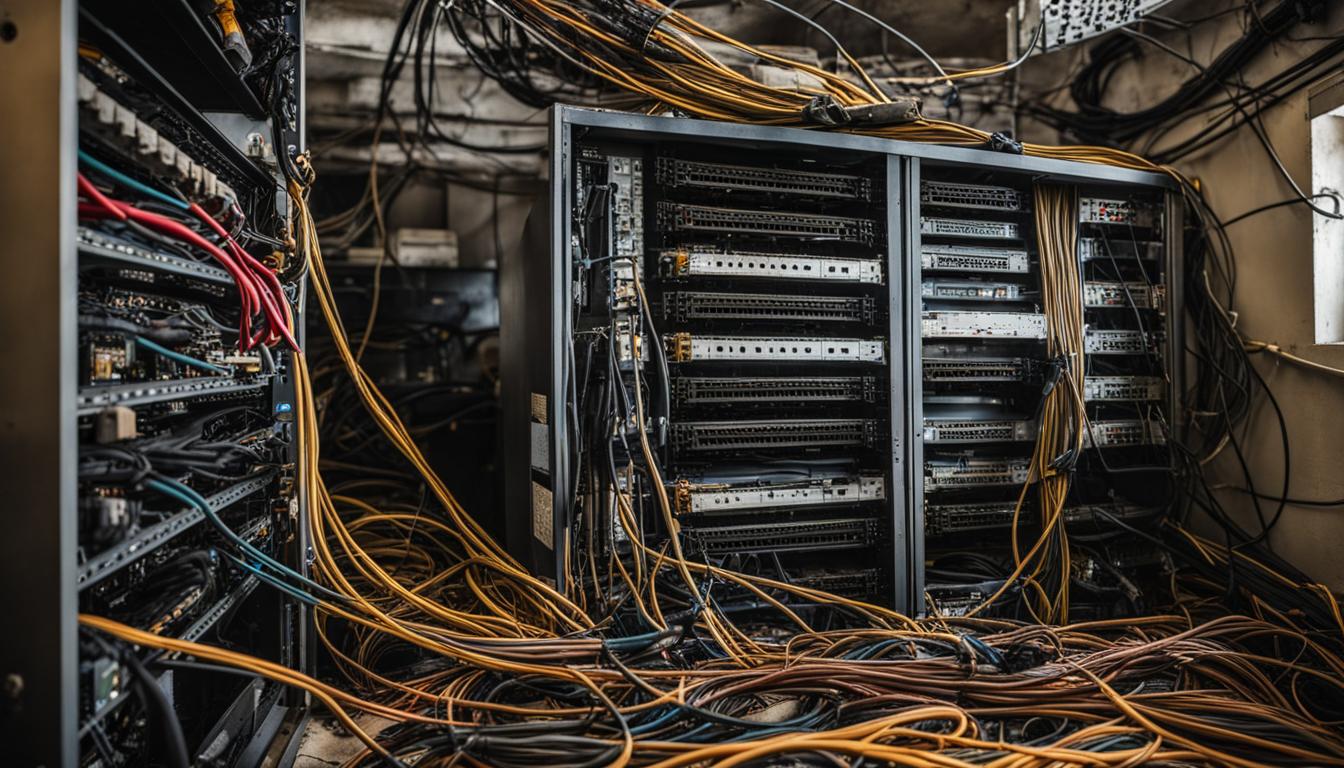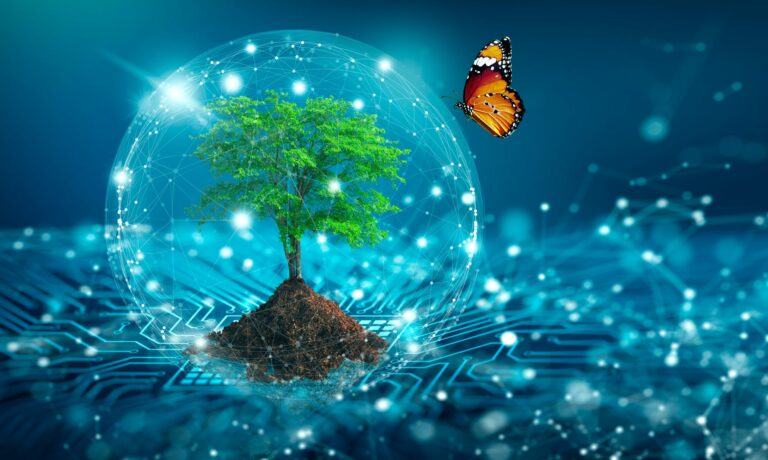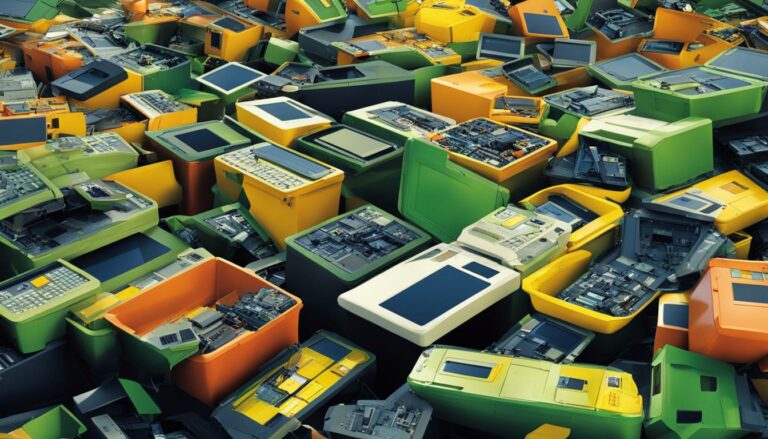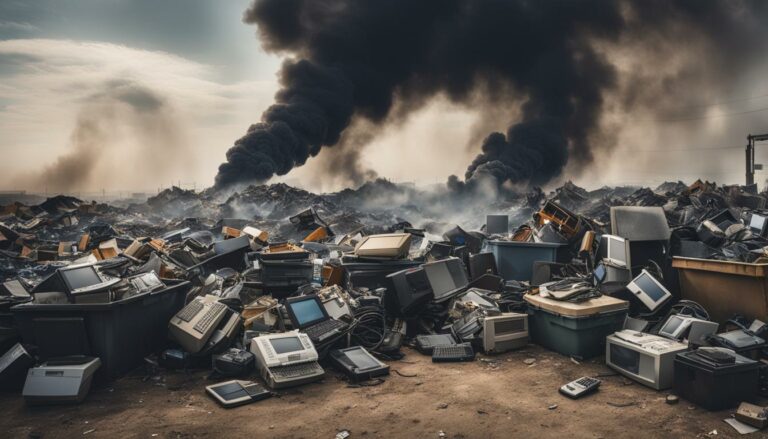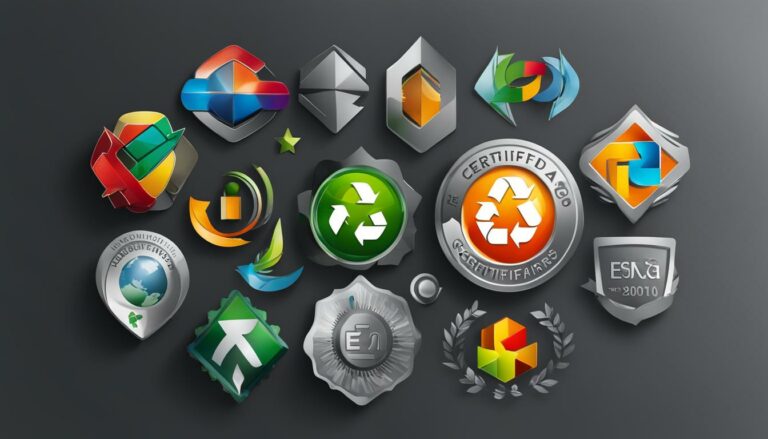Network Recycling in the Era of 5G
As 5G technology becomes the new standard worldwide, the need for network recycling has become imperative. With its vast expansion and connectivity potential, 5G brings countless benefits, but it also poses challenges in terms of sustainability and electronic waste. In this article, we will explore the impact of 5G infrastructure changes and the need for proper electronic waste disposal. We will also discuss how consumers and businesses can navigate this landscape responsibly. Additionally, we will delve into the potential of leveraging 5G technology for environmental sustainability and its role in enhancing connectivity and efficiency in smart cities.
Key Takeaways
- 5G technology brings both advancements and challenges
- Proper electronic waste disposal is crucial to mitigate environmental impact
- Recycling outdated technology reduces the impact of electronic waste
- Trusted tech recycling companies offer safe disposal and recycling solutions
- 5G technology has the potential to drive sustainability and enable smart cities
The Impact of 5G Infrastructure Changes
The transition to 5G technology will necessitate significant changes in our current IT infrastructure. With the advent of 5G, existing devices will need to be replaced as they will not be compatible with the new cellular network system. This wave of infrastructure changes will result in a substantial increase in electronic waste production.
Wireless communication is at the heart of 5G technology. As more devices become connected and communication speeds increase, the demand for faster and more efficient networks continues to grow. However, this rapid advancement comes at a cost. The replacement of outdated devices and infrastructure will result in larger volumes of electronic waste.
Table: Comparison of Electronic Waste Production Before and After 5G Upgrade
| Component | Before 5G Upgrade | After 5G Upgrade |
|---|---|---|
| Smartphones | 10 million | 30 million |
| Tablets | 5 million | 15 million |
| Laptops | 3 million | 9 million |
According to industry experts, the transition to 5G infrastructure will result in a significant increase in electronic waste production. This highlights the need for proper disposal and recycling initiatives to mitigate the environmental impact.
The electronic waste industry is already one of the fastest-growing industries globally, and without effective recycling initiatives, the negative environmental consequences could be substantial. It is crucial to prioritize the development of proper electronic waste disposal methods to minimize the ecological impact of the 5G upgrade.
The Need for Proper Electronic Waste Disposal
Proper electronic waste disposal is of utmost importance to prevent environmental damage. The increasing amount of electronic waste, or e-waste, generated by the rapid obsoletion of technology poses significant challenges. E-waste contains harmful materials that can cause harm to both people and the environment if not properly recycled or discarded. It is essential to understand the importance of recycling and adopting eco-friendly solutions to minimize the impact of e-waste.
Unlike regular waste, e-waste cannot simply be thrown into a landfill. Tech waste often includes components like batteries, circuit boards, and other parts that contain hazardous substances such as lead, mercury, and cadmium. If not disposed of properly, these materials can leach into the soil and water, polluting the environment and posing health risks to humans and wildlife alike. Recycling salvageable parts of outdated technology is a more sustainable and environmentally friendly solution.
In addition to the hazardous materials they contain, electronic devices also have valuable materials that can be recovered through recycling. Precious metals like gold, silver, and platinum can be extracted from e-waste and reused, reducing the need for mining and conserving natural resources. By implementing proper electronic waste disposal practices, we can not only protect the environment but also contribute to a more circular economy.
| Benefits of Proper Electronic Waste Disposal | Impact |
|---|---|
| Prevents environmental pollution | Reduces the release of toxic substances into the soil and water |
| Conserves natural resources | Allows for the recovery of valuable materials through recycling |
| Reduces energy consumption | Helps minimize the need for raw material extraction and production |
| Protects human health | Prevents exposure to harmful substances present in e-waste |
Proper electronic waste disposal is necessary to mitigate the environmental impact of outdated technology. By adopting eco-friendly solutions and recycling salvageable parts, we can contribute to a more sustainable future.
The Consumer Impact of 5G and E-Waste
As companies and consumers eagerly embrace the benefits of 5G technology, it is essential to consider the negative environmental impact that comes with the rapid obsoletion of electronic devices. Upgrading to 5G means replacing old devices with new ones, resulting in a surge of electronic waste (e-waste). To mitigate this impact, it is crucial for businesses and individuals to prioritize proper e-waste disposal and tech recycling.
One solution is to work with trusted tech recycling companies that specialize in electronic waste disposal. These companies ensure that old or outdated devices are recycled in an environmentally friendly manner, minimizing the harmful consequences of e-waste. Some tech recycling companies even offer buyback programs or revenue share options to incentivize recycling and make it more accessible for consumers. By choosing to recycle with these reputable companies, individuals can make a positive impact by reducing their carbon footprint and contributing to a circular economy.
“Proper electronic waste disposal is necessary to prevent environmental damage.”
It is also crucial to educate businesses and consumers about the importance of e-waste disposal. Many people are unaware of the harmful materials present in electronic devices and the potential environmental and health risks associated with improper disposal. By spreading awareness and providing easy access to information about local recycling centers or tech recycling programs, we can encourage more individuals to take responsibility for their e-waste and make sustainable choices.
The Benefits of Responsible E-Waste Disposal
Responsible e-waste disposal not only reduces environmental harm but also allows for the recovery of valuable materials. Many electronic devices contain precious metals like gold, silver, and copper that can be extracted through recycling. Additionally, recycling e-waste reduces the need for raw materials extraction, conserves energy, and minimizes greenhouse gas emissions. By adopting responsible e-waste practices, we can transition to a more sustainable future and ensure that the consumer impact of 5G technology is as positive as possible.
| Benefits of Responsible E-Waste Disposal | Impact |
|---|---|
| Reduces environmental harm | Prevents toxic materials from contaminating soil and water |
| Recovery of valuable materials | Extract precious metals, reducing the need for mining |
| Conserves energy | Reduces the energy required for raw materials extraction |
| Minimizes greenhouse gas emissions | Prevents the release of harmful gases during manufacturing |
By understanding the consumer impact of 5G and e-waste disposal, we can make informed decisions and actively contribute to sustainable practices. Embracing responsible e-waste disposal and tech recycling ensures that the benefits of 5G technology are not overshadowed by its environmental consequences. Let’s work together to create a greener and more connected future.
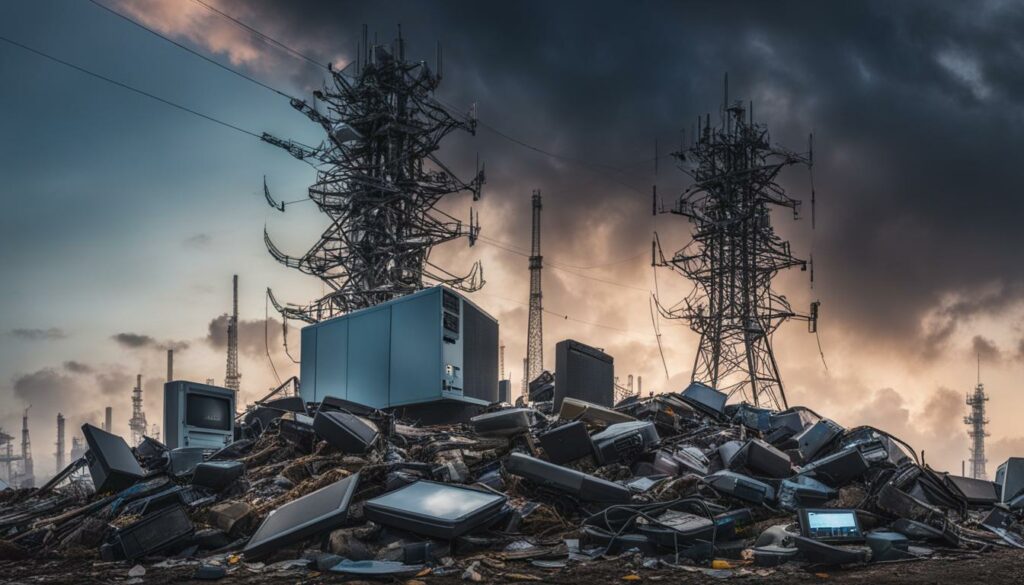
The Tidal Wave of E-Waste from 5G Upgrade
The upgrade to 5G infrastructure is set to make a significant impact on electronic waste production. As more and more consumers and businesses embrace 5G technology, the rapid obsoletion of current devices will result in a tidal wave of e-waste. This surge in electronic waste poses challenges for proper disposal and recycling efforts, calling for increased awareness and responsible practices.
Many states have implemented landfill disposal bans on electronic items, including phones, tablets, and other cellular devices. These bans make it illegal to dispose of these items in landfills due to the harmful materials they contain. With the rollout of 5G, the need for responsible electronics recycling becomes even more critical. Businesses and consumers must be educated and encouraged to recycle their outdated technology to prevent environmental damage.
Proper electronic waste disposal not only helps mitigate the environmental impact but also allows for the recovery and reuse of valuable materials. Recycling salvageable parts from outdated devices promotes a circular economy, reducing the need for raw materials and conserving energy. Additionally, responsible e-waste disposal helps prevent the release of hazardous substances into the environment, safeguarding public health and well-being.
To truly address the tidal wave of e-waste resulting from the 5G upgrade, it is essential to establish comprehensive recycling programs and partnerships. Tech recycling companies specializing in electronic waste disposal play a vital role in ensuring that devices are recycled properly and harmful materials are disposed of safely. These companies often offer buyback and revenue share programs, incentivizing businesses and consumers to recycle their outdated technology and contribute to a sustainable future.
| Electronic Waste Challenges from 5G Upgrade | Key Considerations |
|---|---|
| Massive increase in e-waste production | – Educate businesses and consumers about the environmental impact of improper e-waste disposal. – Encourage recycling through awareness campaigns and incentive programs. |
| Landfill disposal bans on electronic items | – Ensure businesses and consumers are aware of and compliant with the landfill disposal bans. – Provide accessible recycling options to avoid illegal disposal. |
| Importance of proper e-waste disposal | – Highlight the environmental and health benefits of recycling and responsible waste management. – Promote the recovery and reuse of valuable materials through proper recycling processes. |
| Role of tech recycling companies | – Collaborate with tech recycling companies specializing in electronic waste disposal. – Explore buyback and revenue share programs to incentivize recycling. |
Leveraging 5G Technology for Environmental Sustainability
5G technology has the potential to revolutionize the way we approach sustainability and environmental conservation. Its high-speed connectivity and capacity to handle massive amounts of data make it a valuable tool in optimizing energy usage, reducing greenhouse gas emissions, and expanding the application of renewable energy sources.
By leveraging 5G technology and combining it with the Internet of Things (IoT), we can monitor and control energy consumption in real-time. Smart devices and sensors linked through 5G networks provide valuable insights into energy usage patterns, allowing us to identify areas for improvement and implement energy-saving measures more effectively. This data-driven approach enables businesses and individuals to make informed decisions regarding their energy consumption and contribute to a more sustainable future.
In addition to energy efficiency, 5G technology can also help address other environmental challenges. For example, it can play a crucial role in reducing water and food waste through intelligent monitoring and resource management systems. By collecting and analyzing real-time data on water usage and crop conditions, 5G-enabled devices can optimize irrigation systems, minimize water waste, and ensure more efficient use of resources in agriculture.
Furthermore, 5G networks can facilitate the integration of sustainable practices across various industries. For example, in transportation, 5G-powered smart traffic control systems can improve traffic flow, reduce congestion, and minimize fuel consumption, thereby decreasing pollution and greenhouse gas emissions. Similarly, in manufacturing, 5G-enabled automation and connectivity can enhance production efficiency and enable real-time monitoring of energy usage, leading to more sustainable operations.
It is evident that the potential benefits of 5G technology extend beyond faster and more reliable communication. By harnessing its power and combining it with sustainable practices, we can create a more environmentally conscious and connected future. However, it is crucial to prioritize these initiatives and ensure that they are implemented on a global scale to maximize their impact. Through collaboration between governments, businesses, and individuals, we can leverage 5G technology to drive positive change and build a more sustainable world for future generations.
Enhancing Connectivity and Efficiency in Smart Cities
Smart cities are the future of urban development, utilizing advanced technologies to enhance connectivity, optimize resource management, and improve the quality of life for citizens. The combination of 5G and Internet of Things (IoT) technology plays a crucial role in creating sustainable and efficient smart cities. With 5G’s high-speed and low-latency capabilities, IoT devices can connect seamlessly, enabling real-time data collection and analysis for various city management applications.

One of the key areas where 5G and IoT can revolutionize smart cities is energy management. By deploying smart meters, sensors, and devices throughout a city, energy consumption can be monitored and optimized in real time. These devices can collect data on electricity usage, water consumption, and air quality, providing valuable insights for city authorities to make informed decisions on resource allocation and energy-saving initiatives.
Furthermore, 5G’s ultra-reliable and low-latency communication allows for efficient traffic control in smart cities. Intelligent traffic management systems can leverage real-time data from sensors embedded in roads, traffic lights, and vehicles to adjust traffic flow dynamically. With this technology, traffic congestion can be minimized, leading to reduced emissions and improved air quality.
Benefits of 5G and IoT in Smart Cities:
- Real-time data collection and analysis for efficient resource management
- Optimized energy consumption through smart meters and sensors
- Dynamically adjusted traffic flow for reduced congestion and improved air quality
- Improved emergency response and public safety with connected devices
- Enhanced urban planning and infrastructure management
“The integration of 5G and IoT technology in smart cities brings endless possibilities for improving sustainability, efficiency, and quality of life. By harnessing the power of real-time data, cities can become greener, safer, and more connected.” – Smart City Development Expert
| Smart City Applications | Benefits |
|---|---|
| Smart Grids | Improved energy efficiency and reliability |
| Intelligent Transportation Systems | Reduced traffic congestion and emissions |
| Smart Buildings | Optimized energy usage and enhanced comfort |
| Public Safety and Security | Enhanced emergency response and crime prevention |
| Waste Management | Efficient garbage collection and recycling |
Conclusion
The rollout of 5G technology brings about significant advancements in wireless communication. However, it also poses a challenge in terms of increased electronic waste production, which has a negative environmental impact. To address this issue, network recycling and proper electronic waste disposal are crucial.
By prioritising network recycling, we can mitigate the environmental impact of the rapid obsoletion of current tech devices due to the 5G upgrade. This will help reduce electronic waste and promote sustainability. It is essential for businesses and consumers to understand the importance of responsible electronic waste disposal and work with trusted tech recycling companies to ensure proper recycling and disposal of old or outdated devices.
Leveraging 5G technology for sustainability is key. The speed and connectivity of 5G networks, combined with the Internet of Things (IoT), offer opportunities to improve energy efficiency, reduce greenhouse gas emissions, and enable the use of renewable energy. By optimising energy use through smart devices and sensors and expanding sustainable practices in various industries, 5G can contribute to a more environmentally conscious future.
In conclusion, while 5G technology brings numerous benefits, it is crucial to be mindful of its environmental impact. By embracing network recycling, proper electronic waste disposal, and leveraging 5G for sustainable technology, we can create a more connected future that is both technologically advanced and environmentally responsible.
FAQ
What is 5G?
5G is the fifth generation of wireless technology that provides faster and more efficient wireless communication.
How does 5G impact electronic waste?
The upgrade to 5G infrastructure requires the replacement of many devices, resulting in larger volumes of electronic waste.
Why is proper electronic waste disposal necessary?
Electronic waste often contains harmful or radioactive materials that can harm people and the environment if not properly recycled or discarded.
Where can I dispose of electronic waste?
Look for trusted tech recycling companies that specialize in electronic waste disposal. They ensure proper recycling and safe disposal of harmful materials.
Can I throw electronic waste in landfills?
Many states have landfill disposal bans on electronic items, including mobility products. It is illegal to dispose of them in landfills.
How can 5G technology contribute to sustainability?
5G, combined with the Internet of Things (IoT), can improve energy efficiency, reduce emissions, and enable the use of renewable energy.
What are the benefits of 5G for smart cities?
5G enables efficient resource management, improved energy management, and optimized traffic control in smart cities through real-time data analysis.
Why is network recycling important in the era of 5G?
Network recycling is crucial to minimize the environmental impact of the rapid obsoletion of devices and the resulting electronic waste.


